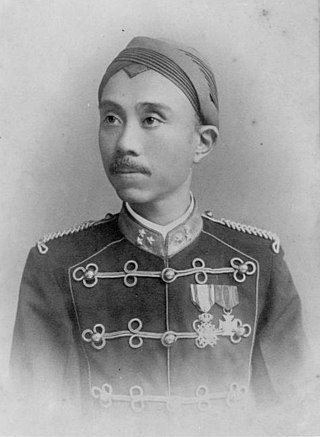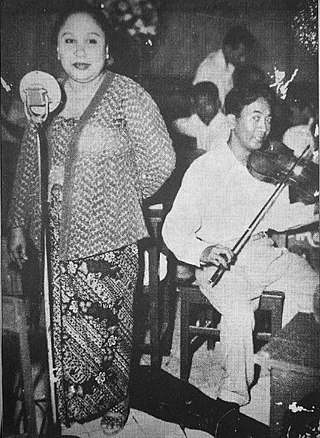
The Sultanate of Mataram was the last major independent Javanese kingdom on the island of Java before it was colonised by the Dutch. It was the dominant political force radiating from the interior of Central Java from the late 16th century until the beginning of the 18th century.

Betawi people, or Batavians, are an Austronesian ethnic group native to the city of Jakarta and its immediate outskirts, as such often described as the native inhabitants of the city. They are the descendants of the people who inhabited Batavia from the 17th century onwards.

Pakubuwono X was, despite his regnal name, the ninth Susuhunan (Monarch) of Surakarta. He reigned from the 1893 to 1939, making him the longest reigning Sunan in the history of Surakarta.

Poerbatjaraka was a Javanese/Indonesian self-taught philologist and professor, specialising in Javanese literature. The eldest son of a Surakarta royal courtier in the Dutch East Indies, he showed interest in Javanese literature at an early age, reading from books in the court's collection. Despite attending only primary school, his knowledge of Dutch and Javanese literature allowed him to take a position at the colony's Archaeology Service, and then at Leiden University in the Netherlands. He was allowed to obtain a doctor's degree at Leiden. He then returned to the colony to work at a Batavia museum, cataloguing Javanese texts and writing scholarly works. After Indonesia's independence, he became a professor at the universities of Indonesia, Gajah Mada, and Udayana.

Pakubuwono XI was the eleventh Susuhunan during the Second World War – and during the Japanese occupation of Java.

Pakubuwono XII was the twelfth Susuhunan and the longest ruling of all monarchs in Surakarta history.

Raden Ayu Siti Hartinah, also known as Siti Hartinah Soeharto or Tien Soeharto, was the First Lady of Indonesia from 1967 until 1996. She was the wife of second Indonesian president, Suharto.
Kangjeng Gusti Pangeran Adipati Arya Mangkunegara I, also known as Pangeran Sambernyawa, his birth name was Raden Mas Said, established the Puro Mangkunegaran, in Surakarta, Java Island. Thus, he was the first ruler of The Principality of Mangkunegaran.

Surakarta Sunanate is a Javanese monarchy centred in the city of Surakarta, in the province of Central Java, Indonesia.

Mangkunegara VI was the prince of Mangkunegaran from 1896 to 1916.
Tjerita "Oeij-se": Jaitoe Satoe Tjerita jang Amat Endah dan Loetjoe, jang Betoel Soedah Kedjadian di Djawa Tengah is a 1903 Malay-language novel by the ethnic Chinese writer Thio Tjin Boen. It details the rise of a Chinese businessman who becomes rich after finding a kite made of paper money in a village, who then uses dishonesty to advance his personal wealth before disowning his daughter after she converts to Islam and marries a Javanese man.

Karkono Partokusumo, better known by the pen name Kamadjaja, was an Indonesian journalist and author, who rose to prominence during the Japanese occupation of the Dutch East Indies.
Amangkurat III was a short-lived susuhunan (ruler) of the Sultanate of Mataram, who reigned 1703–1705.

Tan Eng Goan, 1st Majoor der Chinezen was a high-ranking bureaucrat who served as the first Majoor der Chinezen of Batavia, capital of colonial Indonesia. This was the highest-ranking Chinese position in the civil administration of the Dutch East Indies.

Oey Tamba Sia, also spelt Oeij Tambah Sia, or often mistakenly Oey Tambahsia, was a rich, Chinese-Indonesian playboy hanged by the Dutch colonial government due to his involvement in a number of murder cases in Batavia, now Jakarta, capital of colonial Indonesia. His life has become part of Jakarta folklore, and inspired numerous literary works.
The Third Javanese War of Succession was an armed conflict from 1749 to 1757 on the island of Java. It led to the partition of the Mataram Sultanate into two and later three nominally independent 'Princely States': Surakarta, Yogyakarta and Mangkunegara.
Letnan Cina Oey Thai Lo was a notable Chinese-Indonesian tycoon who acted as a pachter for tobacco in the early 19th century.

Raden Ajeng Srimulat, also known simply as Srimulat, was an Indonesian comedian, actor, singer, and founding member of the popular Srimulat comedy troupe. She was the wife of Teguh Slamet Rahardjo, one of the most famous Indonesian comedians of the postwar era.

Jurit Ampil Kridha Warastra is a classical Javanese dance originating from Salatiga, Central Java, Indonesia. The dance depicts the concubines from Mangkunegara I or Raden Mas Said in the Salatiga Agreement. This dance is can be performed in teams, in pairs, and individually. The classic elements of the dance are found in the movement, song accompaniment, clothing, and make-up, but now they have been combined with new elements that follow the times.

Gusti Raden Ayu Siti Nurul Kamaril Ngasarati Kusumowardhani was an Indonesian dancer and the only daughter of Mangkunegara VII with his mistress, Gusti Kanjeng Ratu Timoer. She was known for her performance at the Princess Juliana of the Netherlands and Prince Bernhard of Lippe-Biesterfeld marriage in 1937, and for rejecting the marriage proposal from Hamengkubuwono IX, Sutan Sjahrir, and Sukarno due not want to be in polygamy.














